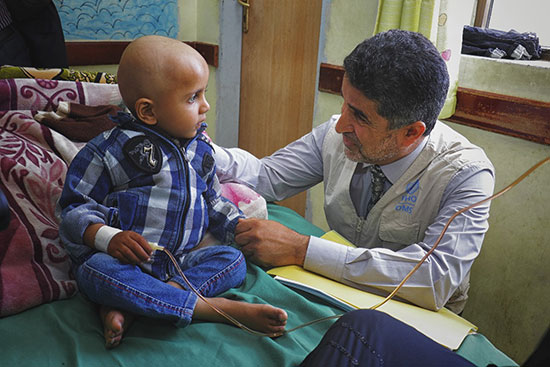 23 March 2019 - I have just returned from Yemen, where I witnessed firsthand the suffering, illness and death of innocent civilians caught up in this crisis.
23 March 2019 - I have just returned from Yemen, where I witnessed firsthand the suffering, illness and death of innocent civilians caught up in this crisis.
In my visits to hospitals in Aden and Sana’a, I saw newborn babies and children, sometimes 2-3 to a bed, suffering from severe acute malnutrition, heart and renal failure, pneumonia and other life-threatening conditions. Doctors told me that some would not survive the week.
I met weak and frail kidney failure patients who receive dialysis sessions only once week, instead of the standard three, due to shortages in supplies. I witnessed cholera patients desperately clinging to life, fighting to survive a disease that is usually treatable under normal circumstances. There are patients with treatable forms of cancer who are dying needlessly, because they cannot afford the care, or it is simply not available.
In the Intensive Care Unit of Al-Thawra Hospital, a patient died before my eyes as doctors stood by helplessly, unable to save him. With more than half of all hospitals across the country not functional, and others barely operational due to shortages in medicines and supplies, many patients who can barely afford the cost of transport either die at home or reach health facilities too late.
I met many brave and heroic health staff, truly the backbone of the health system, who had not been paid in years yet were determined to keep working every day under incredibly difficult circumstances.
Amidst this massive suffering and despair, I saw signs of hope. I met Khadeeja, a little girl who was once severely malnourished and on the verge of death. Her parents travelled for hours to find a hospital that could treat her. She was admitted to a WHO-supported Therapeutic Feeding Centre, and weeks later, her condition improved. Many more months later, she is a happy, healthy, well-nourished girl.
We saved people like Ali, whose world fell apart last year when he learned that his eight children and wife tested positive for cholera. They received medical care in the diarrhoea treatment centre at Al-Sabeen Hospital jointly supported by WHO and UNICEF. They all survived, and Ali said that a new life was granted for him and his family.
Despite the unfolding tragedy in Yemen, stories like Ali’s and Khadeeja’s show that our work makes a difference. Last year, with 81% of required funding received as part of the 2018 Humanitarian Response Plan, WHO was able to successfully reach 13 million people, exceeding the target population of 10 million.
I call upon the international community to continue supporting our immediate lifesaving work in Yemen, while we also lay the foundation for investments in the health workforce and health system.
This year, WHO and health partners require US$ 627 million as part of the 2019 Humanitarian Response Plan for Yemen. This support will allow us to further improve access to primary, secondary and tertiary health care; ensure that hospitals in priority districts are able to respond to epidemics and outbreaks; and help restore the functionality of closed or damaged health facilities in high priority districts.
This year, humanitarian partners have recognized that meeting health needs is one of the top two priorities in Yemen, highlighting the urgency with which we need to act. The brave humanitarian aid staff working for our health partners in Yemen who have dedicated their lives to helping others must be allowed to continue uninterrupted.
As we continue to scale up our response to address the world’s worst humanitarian crisis I also call on all parties to the conflict to protect health staff and health facilities, and ensure safe and sustained access for humanitarian aid to enter the country. It is my sincere hope that the parties involved will come to a sustained peace settlement, which is the only sustainable answer to the humanitarian needs in Yemen.








